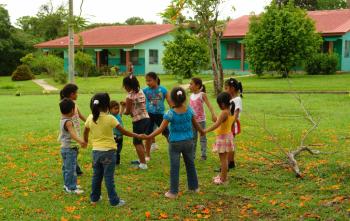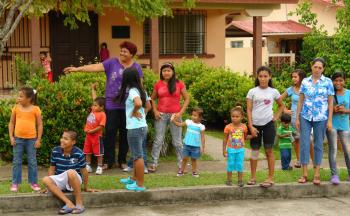High levels of poverty continue to endanger children’s safety
-63619_JPG.jpg?width=800)
Penonomé is the capital of the Coclé province in central Panama and has a population of over 88,000 inhabitants. Farming and fishing activities, such as the growing of sugar cane, coffee or corn, form the basis of the economy in the region. Although government welfare programmes have contributed to the reduction of extreme poverty in the Coclé province in recent years, general poverty remains incredibly high at over 50 per cent. The main factors that cause families to live in conditions where they are unable to meet basic needs such as food or appropriate housing are low levels of education and a resulting inability to enter the formal labour market.
Due to the great number of struggling families, child labour also continues to be a grave problem in the region. The legal working age in Panama is 14, but many children as young as six or seven engage in agricultural activities in order to contribute to the family income. Historically, children would travel to Cocl̩ Рwith their families or alone Рto work for a sugar refinery during the harvest. This type of work has declined in recent years but is far from eradicated, and many children now engage in other types of labour, e.g. as domestic employees.
Child labour seriously endangers the healthy physical and psychological development of a child, in addition to interfering with their education and thus jeopardising their chances later in life.
Young people need support and education so that they can build a future for themselves
What makes the situation even more difficult for many families is the fact that around 20 per cent of all children in Panama are born to teenage mothers. Only around 54 per cent of women in the country are estimated to use modern forms of contraception, often due to a lack of education on the matter. Providing for their children is especially difficult for these young women because in most cases they do not hold the qualifications necessary to obtain formal work. Not only is the future of these children endangered, but young women also find themselves in a situation where they may be unable to better their prospects for the future. In the worst cases, this may lead to the abandonment of the child.
What we do in Penonomé
-63617_JPG.jpg?width=800)
SOS Children’s Villages began its work in Penonomé in 1991. Today, 14 SOS families can provide a loving home for up to 126 children who are no longer able to live with their parents. In each family, they live with their brothers and sisters, affectionately cared for by their SOS mother.
When young people from the village feel ready to move out of the family home in order to pursue further education or vocational training, the SOS Youth Programme makes shared accommodation available to them. With the support of qualified counsellors, the young people live together and learn to take responsibility, plan their future and prepare for independent adult life.